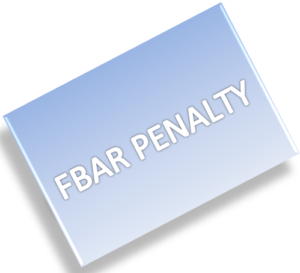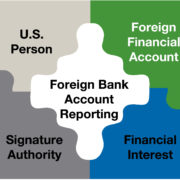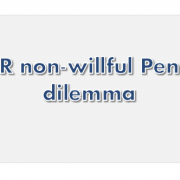The Willful FBAR Penalty: Is it Limited to $100,000? Not so Fast.
Assessment of FBAR penalty

Some practitioners have applauded the decision in United States v. Colliot, 2018 U.S. Dist. LEXIS 83159 (W.D. Tex. 2018) and have even suggested that the assessment of the willful FBAR penalty is limited to the “greater of the amount (Not to Exceed $100,000) equal to the balance in the account at the time of the violation or $25,000.” The Court in Colliot, ruled in favor of the Taxpayer, relying upon 31 C.F.R. § 1010.820 (Previously cited as 31 C.F.R. § 103.57), a regulation promulgated under a prior version of the Bank Secrecy Act. The U.S. District Court held that the earlier regulation was still valid, notwithstanding the changes to the FBAR penalty structure under the American Jobs Creation Act of 2004 (AJCA), which increased the maximum FBAR penalty for willful violations to the greater of $100,000 or 50% of the Balance of the Account. The Court reached its conclusion citing the absence of any new regulation adopting the higher penalty amount provided for under § 5321(a)(5).
Reliance upon Colliot is inaccurate, misplaced and inconsistent with Congressional intent. The limitation articulated by the Court in Colliot with respect to the willful FBAR penalty is in direct conflict with § 5321(a) (5) (C) (i) of the AJCA. Furthermore, the decision in Norman v United States case (Ct. Fed. Cl. Dkt 15-872T, Order dated 7/31/18) and the legislative history related to § 5321(a) (5) (C)(i) of the AJCA make clear that taxpayers who argue for the lower penalty provided for under 31 C.F.R. § 1010.820 will in all likelihood be unsuccessful. The question of whether the willful FBAR penalty is limited to the greater of $100,000 or 25% of the account balance at the time of the violation, requires a detailed discussion of Colliot and Norman, The Bank Secrecy Act and the relevant statutes and regulations as well as an examination of the legislative history and case law addressing statutory and regulatory conflicts.
Bank Secrecy Act (BSA)
On October 26, 1970 Congress enacted the Bank Secrecy Act (BSA) also known as the “Currency and Foreign Transaction Reports” to the address the legal and economic impact of foreign banking in the United States. The BSA was enacted, in part, based upon the findings by the House Committee on Banking and Currency (the “Committee”). Following a one day investigative hearing held on December 9, 1968, the Committee concluded that Americans were using secret foreign bank accounts and foreign financial institutions for nefarious purposes including income tax evasion, money laundering and other crimes.
As part of the BSA, Congress tasked the Treasury Secretary with the responsibility of promulgating regulations designed to facilitate the implementation of the BSA. As part of the implementation of the BSA, 31 C.F.R.§103.27, a U.S. Citizen with an interest in or control over one or more foreign financial accounts with a value exceeding $10,000 at any time during that calendar year is required to file FinCen Form 114 (previously TDF 90-22.1) with the Commissioner of Internal Revenue on or before June 30 of the following year. Although the power to assess a civil monetary penalty for FBAR violations was initially vested with the Treasury Secretary, it was later delegated to the Financial Crimes Enforcement Network (FinCEN). Treasury Order 180-01, 67 Fed. Reg. 64697 (2002). Authority was once again delegated to the Internal Revenue Service. 31 C.F.R. § 103.57.
Prior to 2004, The BSA permitted the imposition of an FBAR penalty only for willful violations of §5314. The penalty for willful violations prior to 2004 was capped at the greater of $25,000 or $100,000 under § 5321(a) (5) (B). Enforcement of § 5321(a)(5)(B) is mirrored in the regulations under 31 CFR §103.57(g)(2). Although §5314 is silent on the assessment of a negligence penalty, the regulations permit the assessment of a negligence penalty not to exceed $500.00. 31 CFR §103.57(h).
Civil FBAR penalty Amendment and willful failure
The civil FBAR penalty structure was amended in 2004 as part of the AJCA to include a maximum penalty of $10,000 for any violation of the provisions of §5314. In addition, the penalty for willful FBAR violations previously provided for in § 5321(a) (5) (B) was increased under §5321(a)(5)(C)(i), a newly created provision, to the greater of $100,000 or 50% of the of the account balance. The legislative history related to the changes to the willful FBAR penalty and the addition of the non-willful civil FBAR penalty chronicles Congressional concern over the lack of compliance in financial reporting related to offshore accounts. Congress made clear that improved compliance was the impetus behind raising the maximum penalty for willful FBAR violations:
“The Congress understood that the number of individuals using offshore bank accounts to engage in abusive tax scams has grown significantly in recent years. For one scheme alone, the IRS estimates that there may be hundreds of thousands of taxpayers with offshore bank accounts attempting to conceal income from the IRS. The Congress was concerned about this activity and believed that improving compliance with this reporting requirement is vitally important to sound tax administration, to combating terrorism, and to preventing the use of abusive tax schemes and scams. The Congress believed that increasing the prior-law penalty for willful noncompliance with this requirement and imposing a new civil penalty that applies without regard to willfulness in such noncompliance will improve the reporting of foreign financial accounts.” Joint Committee on Taxation, General Explanation of Tax Legislation Enacted in the 108th Congress, JCS-5-05 at 387 (2005).
Congress also created a separate provision for a civil penalty for Non-Willful violations, making a clear distinction between willful and non-willful violations. H.R. Rep 108-755 at 615 (2004) (Conf. Rep.).
In Colliot, the IRS filed a lawsuit against Dominque G. Colliot to reduce the assessed penalties to a money judgment. The action filed in the United States District Court for Western Texas related to penalties that were assessed for willful failure to file FBAR’s for 2007-2010. The IRS assessed a $544,773 penalty for the tax year 2007 and $196,082 for the tax year 2008. Smaller penalties were also assessed for the tax years 2009 and 2010. In assessing the penalties, the IRS relied upon the authority contained in § 5321(a)(5) and 31 C.F.R. § 1010.820(g)(2). In response, Colliot filed a motion for summary judgment asserting that IRS incorrectly applied the law in calculating the civil willful FBAR penalties.
In its analysis, the Court discussed the 2004 amendment to § 5321 which increased the maximum civil penalties that could be assessed for the willful failure to file an FBAR, and in doing so, acknowledged the increase in the willful FBAR penalty to a minimum of $100,000 and a maximum of 50% of the balance in the unreported account at the time of the violations. The Court also noted the absence of any change to 31 C.F.R. §1010.820(g)(2), which caps the maximum willful FBAR penalty at $100,000. In granting Colliot’s motion for summary judgement, the Court wholly ignored United States v. Larionoff, 431 U.S. 864, 873 (1977) and instead focused on the powers delegated by Congress to the Treasury Secretary under § 5321(a)(5) to determine the amount of penalty so long as it did not exceed the ceiling set by § 5321 (a)(5)(C).
In Larionoff, the Supreme Court, citing Bowles v.Seminole Rock Co, 325 U.S. 410,414 (1945) and quoting language from the Bowles decision stated:
“In construing administrative regulations, ‘the ultimate criterion is the administrative interpretation, which becomes of controlling weight, unless it is plainly erroneous or inconsistent with the regulation”. Id. at 873.
The Court, citing Manhattan General Equip Co. v Commissioner, 297 U.S. 129,134(1936) further stated:
“For regulations, in order to be valid, must be consistent with the statute under which they are promulgated.” Id at 873.
In Manhattan General Equip Co., the Supreme Court held that:
“A regulation which does not do this, but operates to create a rule out of harmony with a statute, is a mere nullity” Id at 134.
In the Norman decision, the IRS assessed a penalty against Mindy P. Norman in the amount of $803,530 for the willful failure to file an FBAR in connection with a Swiss bank account she maintained during the tax year 2007. The taxpayer appealed the assessment with the IRS Office of Appeals, who affirmed the IRS assessment, concluding that Ms. Norman willfully failed to file an FBAR. The Taxpayer then paid the penalty in full and instituted an action In the United States Court of Federal Claims. Following a one day trial and in response to a letter sent by the Norman citing the Colliot decision, the Court of Claims, Ordered the IRS to respond and comment on Colliot. The IRS filed a timely response. However, the Court did not permit the Taxpayer to file a reply. After considering the IRS response and the trial testimony and other documents, the Court ruled in favor of the IRS and concluded that Ms. Norman willfully failed to file an FBAR in 2007 and that the assessed penalty in the amount of 50 percent of the balance of the unreported account was proper.
In arriving at its decision, the Norman Court painstakingly dissected the Colliot decision and properly pointed out the defects in the District Court’s logic in ruling in favor of the Ms. Colliot. The Court of Claims traced the legislative history of the BSA, the relevant statutory and regulatory provisions and the impact of the changes to the FBAR penalty structure as a result of the AJCA. The Court concluded that the District Court in Colliot ignored the mandate created by the amendment in 2004 and instead elected to focus on the language in §5321(a)(5) that vests the Secretary of the Treasury with the discretion to determine the amount of the penalty.
The Court of Claims cited the following language used by Congress in amending the statute as a basis for invalidating C.F.R. § 1010.820:
“Congress used the imperative ‘shall’ rather than the permissive, ‘may,’ thereby raising the ceiling for the penalty, and in doing so, removed the Treasury Secretary’s discretion to regulation any other maximum.” Norman at Pg. 8.
The Norman Court cited Larionoff for the proposition that Congress has the power to supersede regulations by amending a statute. The Court stated that “in order to be valid [,] [regulations] must be consistent with the statute under which they are promulgated.” The Norman Court concluded that § 5321 (a) (5) (C) (i) which sets the maximum penalty to the greater of $100,000 or 50% of the balance of the account, is inconsistent with 31C.F.R. § 1010.820 rendering 31 C.F.R. § 1010.820 invalid.
The foregoing has particular relevance for those who have failed to take advantage of the Offshore Voluntary Disclosure Program, which is now closed, or otherwise failed to utilize the streamlined procedures and those who have made quiet disclosure and now found themselves the subject of a grand jury subpoena. The IRS has consistently maintained that offshore financial crimes are a top priority and continues to work with its global partners in unmasking those with unreported foreign financial accounts. FATCA is also producing a steady stream of taxpayer information from which the IRS develops leads. In addition, current prosecutions of facilitators and taxpayers as well as taxpayers who have elected to come forward have yielded a treasure trove of information which the IRS is using to identify other non-compliant taxpayers.
Those who have failed to come forward and report their foreign financial accounts are more likely than not, going to be subject to the willful civil FBAR penalty consistent with Norman decision. Mitigation of the willful FBAR penalty is only possible where the taxpayer comes forward and makes an honest disclosure.








